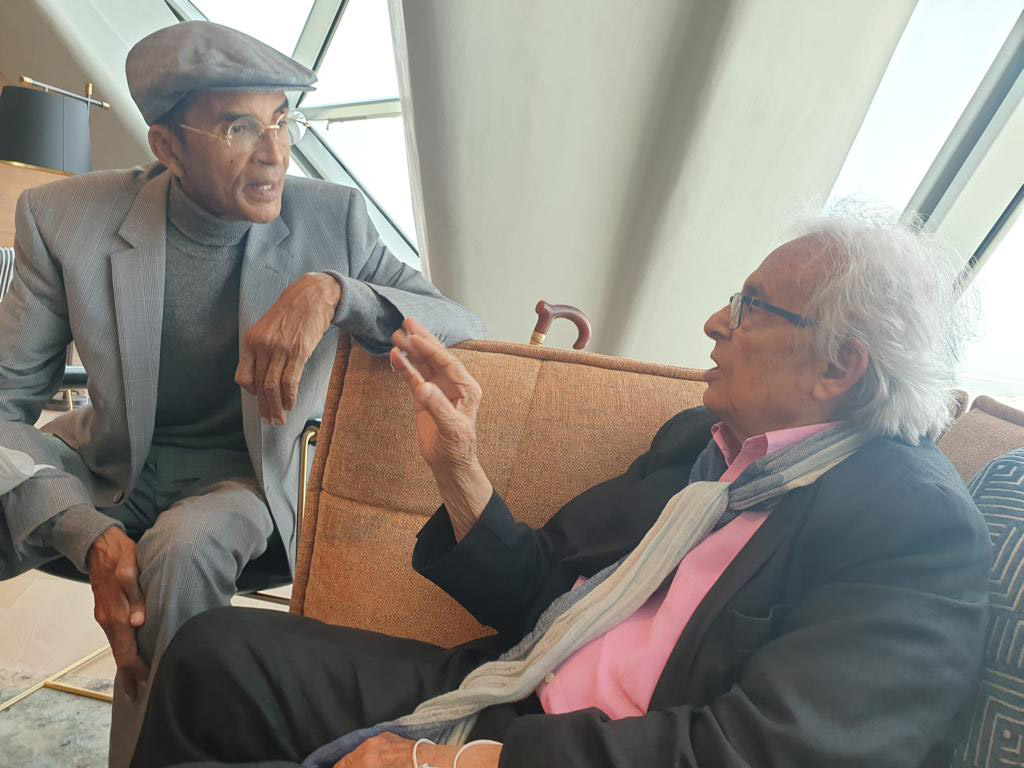KUWAIT: Dr Suad Al-Sabah has organized a special event to honor Libyan writer and thinker Ibrahim Al-Kouni as part of celebrations of 'Loyalty Day' to fete creative Arab icons on Oct 31 and Nov 1 in Bern, Switzerland. Arabic and international literary giants will speak at the event. During the event, a two-part book will be announced to shed light on the life of Kouni. It will highlight the most important events and development phases in his life with regards to his thoughts and writing.
Dr Suad began holding 'Loyalty Day' more than a quarter century ago to recognize living leaders of Arab culture in the Arab world. It is considered the first of its kind in the Arab world, which usually honors its thinkers after their death. The start was during the early 90s after Dr Suad Al-Sabah questioned why thinkers are honored after they depart our world, believing we should honor them while they are still alive so they can feel and acknowledge the love from the people and hear kind appreciative words.
Dr Suad presented her idea to her dear late husband Sheikh Abdullah Al-Mubarak Al-Sabah, may he rest in peace, that thinkers should feel that there are those who appreciate their efforts and that their hard work did not go to waste. The response of the late Abdullah Al-Mubarak was positive, as he appreciated the initiative by saying: "This is how we should work. Our mission is to spread happiness, uphold the truth, appreciate talent, and recognize giving."
Dr Suad Al-Sabah launched the 'Loyalty Day' initiative' in 1995, in a creative hope to honor living leaders of Arab culture. Since then, and throughout her long career, she embodied the initiative in the value of loyalty as a symbol of the highest regard of humility and appreciation, the symbols of achievement, knowledge and modern Arab culture, who have worked hard to present their creativity to guide future generations into the future.
 Suad Al-Sabah
Suad Al-SabahThe initiative has previously honored many leaders, including Abdulaziz Hasan, Ibrahim Al-Areedh, Nizar Qabbani, Dr Tharwat Ukasha, Abdullah Al-Faisal, Abdelkarim Ghallab, Ghassan Twaini, Saleh Al-Ojairi and Al-Habib Al-Janhani, whose books Dar Suad Al-Sabah has published.
Today, the initiative travels to sisterly country Libya to honor an icon of Arab creativity, Ibrahim Al-Kouni, who has published more than a 100 books until now including novels and literary, linguistic, critical, historical and political studies. He has excelled as a literato, anthropologist and historian covering many subjects ranging from the relationship between humans and relationship between humans and animals, as well as love, freedom, isolation and travel. His books have been translated into around 40 languages and are being studied in many international colleges.
Dar Suad Al-Sabah has announced its appreciation of Kouni by inviting many cultural individuals who will speak about his career, accompanied by the two-part book which will shed light on his life and his cultural impact, as well as his development as a writer and thinker, and his personal thoughts and beliefs.
The book includes in its first part a foreword by Dr Suad Al-Sabah, where she mentions that from the depths of the desert came a literary thinker Ibrahim Al-Kouni, like a legend who does not want to let go of the sands from his body. She also points out an observation where Kouni is forsaken and ignored in the Arab world.
Editor of the book Abdelkarim Al-Miqdad writes in his words about the personality of the writer who has forged a creative path by himself since the '70's and excelled as a legend wherever he went, with one success after another. Miqdad has identified the most important subject of Kouni, which is the desert. The first part of the book includes many articles that capture his career and shed light on many personal aspects of his life.
Dr Zahra Saadallawi writes about his start in Libya and his cultural achievements to his travel to Moscow for studies, as well as his media work, then finally residing in Switzerland to make time for his literature. Mustapha Salim points out his knowledge of eight languages including Tamazight, Arabic, Russian, English, Polish, German, Spanish and Latin.
The first part also includes many quotes from Kouni as well as many images which historicize many cultural events and capture many points in his life, as well as his press interviews, which have ironicized his thoughts, saying that the Nobel Prize has ruined literature and has been given to amateurs.
As for the second part of the book, it acknowledges valuable studies and research by elite critics, thinkers and academics from different parts of the Arab world. This part highlights the most important features of his literature and philosophy, which he has captured in most of his writings, as well as technical aspects dedicated to creating his own worlds and features of the desert.











